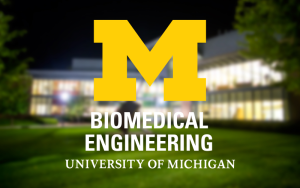Presented By: Biomedical Engineering
Engineering Folliculogenesis in a Biomimetic Matrix
BME PhD Defense: Claire E. Nason-Tomaszewski

Cancer survivorship has increased in recent decades due to advancements in anticancer treatments, yet cancer survivors continue to suffer from irreversible premature ovarian insufficiency and loss of fertility caused by radiation and chemotherapy. Restoration of reproductive function is uniquely challenging because women are born with a non-renewable reserve of ovarian follicles, the functional units of the ovary each carrying an oocyte (egg) and hormone producing somatic cells. Removal of ovarian tissue prior to gonadotoxic treatments and culture of isolated ovarian follicles is a safe fertility preservation option for pediatric and adult patients and does not require delays in treatment or hormonal stimulation. However, a high-yield, translational, and reproducible in vitro culture system that produces fertilizable eggs does not exist. Survival, growth, and maturation of early-stage primordial follicles, which constitute the majority of the follicular reserve, depend on bidirectional paracrine signaling through soluble cytokines and interactions with the extracellular matrix (ECM). To meet the needs of growing ovarian follicles we designed a biomimetic hydrogel for in vitro follicle culture that restores critical cell-cell and cell-matrix interactions for improved follicle outcomes. We hypothesized that a degradable poly(ethylene glycol) (PEG)-based matrix with tunable biophysical properties would (1) enable co-encapsulation of follicles and cells for paracrine signaling and (2) mimic the ECM functions of ovarian tissue.
First, we established that our degradable hydrogel could support co-culture of multiple cell types by co-encapsulating isolated murine primary follicles with adipose-derived stem cells (ADSCs) that secrete survival- and growth-promoting cytokines, compensating for the loss of native stromal cells. Bidirectional crosstalk between follicles and ADSCs promoted folliculogenesis and follicles doubled in size compared to follicles cultured without the ADSCs. Second, we incorporated ECM-sequestering peptides that retain cell-secreted ECM molecules, such as laminin, fibronectin, collagen type 1, and perlecan, thereby restoring cell-matrix interactions and improving growth factor binding. Secondary follicles cultured in PEG functionalized with peptides that bind basement membrane proteins exhibited greater than 93% survival, reached 340 µm in diameter, and achieved oocyte maturation rates of 84%. Lastly, we combined these approaches for restoring paracrine signaling and ECM function for culture of primordial follicles, the most immature and difficult to grow, but most abundant type of follicle in the ovary. We embedded hydrogels with ECM-sequestering dextran fibers to act as a scaffold for ECM deposition, better mimicking the fibrous structure of native ECM. ECM deposition and subsequent cell binding to fibers facilitated follicle and cell aggregation within the hydrogel matrix. Oocyte survival and growth was significantly improved in conditions which formed follicle-like aggregates surrounded by stroma, likely due to restoration of key cell-cell and cell-matrix interactions that promote follicle development.
In conclusion, we have engineered a fully synthetic hydrogel culture system that recapitulates the cellular and extracellular components of native ovarian tissue for improved follicle outcomes. This translational biomaterial is significant for guiding the development of a standardized in vitro culture system for maturation of human follicles and a safe fertility preservation option for cancer survivors unable to produce mature eggs. This biomimetic hydrogel also has broader impacts in the field of tissue engineering as it facilitates cell-driven reconstruction of their native microenvironments, providing a more comprehensive model for deciphering key mechanisms that drive regeneration in vitro.
Date: Wednesday, February 16, 2022
Time: 3:00 PM EST
Zoom: https://umich.zoom.us/j/99438979027 Passcode: GoFollicle
Chair: Dr. Ariella Shikanov
First, we established that our degradable hydrogel could support co-culture of multiple cell types by co-encapsulating isolated murine primary follicles with adipose-derived stem cells (ADSCs) that secrete survival- and growth-promoting cytokines, compensating for the loss of native stromal cells. Bidirectional crosstalk between follicles and ADSCs promoted folliculogenesis and follicles doubled in size compared to follicles cultured without the ADSCs. Second, we incorporated ECM-sequestering peptides that retain cell-secreted ECM molecules, such as laminin, fibronectin, collagen type 1, and perlecan, thereby restoring cell-matrix interactions and improving growth factor binding. Secondary follicles cultured in PEG functionalized with peptides that bind basement membrane proteins exhibited greater than 93% survival, reached 340 µm in diameter, and achieved oocyte maturation rates of 84%. Lastly, we combined these approaches for restoring paracrine signaling and ECM function for culture of primordial follicles, the most immature and difficult to grow, but most abundant type of follicle in the ovary. We embedded hydrogels with ECM-sequestering dextran fibers to act as a scaffold for ECM deposition, better mimicking the fibrous structure of native ECM. ECM deposition and subsequent cell binding to fibers facilitated follicle and cell aggregation within the hydrogel matrix. Oocyte survival and growth was significantly improved in conditions which formed follicle-like aggregates surrounded by stroma, likely due to restoration of key cell-cell and cell-matrix interactions that promote follicle development.
In conclusion, we have engineered a fully synthetic hydrogel culture system that recapitulates the cellular and extracellular components of native ovarian tissue for improved follicle outcomes. This translational biomaterial is significant for guiding the development of a standardized in vitro culture system for maturation of human follicles and a safe fertility preservation option for cancer survivors unable to produce mature eggs. This biomimetic hydrogel also has broader impacts in the field of tissue engineering as it facilitates cell-driven reconstruction of their native microenvironments, providing a more comprehensive model for deciphering key mechanisms that drive regeneration in vitro.
Date: Wednesday, February 16, 2022
Time: 3:00 PM EST
Zoom: https://umich.zoom.us/j/99438979027 Passcode: GoFollicle
Chair: Dr. Ariella Shikanov
Livestream Information
ZoomFebruary 16, 2022 (Wednesday) 3:00pm
Meeting ID: 99438979027
Meeting Password: GoFollicle
Explore Similar Events
-
Loading Similar Events...
